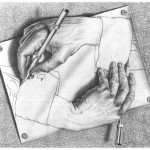Recent News
UNM Engineering names Prabhakar inaugural Cleve Moler and MathWorks Endowed Chair
October 3, 2025
Computer scientist wins Athlete of the Year Award for adaptive skiing technique
May 29, 2025
Hand and Machine Lab wins 2 awards at CHI conference
May 15, 2025
News Archives
[Colloquium] Artificial Cells as Fixed-Points of Distributed Virtual Machines
November 20, 2009
- Date: Friday, November 20th, 2009
- Time: 12 pm — 12:50 pm
- Place: Centennial Engineering Center, Room 1041

Lance R. Williams
Associate Professor
Dept. of Computer Science University of New Mexico

Abstract:
The thing which distinguishes animate from inanimate matter is that animate matter uses information processing to work against entropy and produce a state of increased order in the physical world. Even the simplest single cell organisms are able to translate self-descriptions stored on DNA molecules into copies of themselves. We believe that this remarkable feat, which more than any other defines life itself, is accomplished by means of a process which is intimately related to a topic at the heart of computer science, namely, compilation of programming languages.
Self-replicating systems based on von Neumann’s universal constructor lack transparency and for this reason have had virtually no impact in biology. We believe that fundamental computational principles underlying their operation, e.g., self-reflection, are obscured by the complexity of low-level implementations, e.g., cellular automata. We wish to bridge the gap between principles and implementation by means of transparent automatic processes for translating abstract descriptions of self-reproducing machines into physical implementations. The abstract descriptions are expressions in high-level functional programming languages which are compiled into bytecode quines, i.e., virtual-machine fixed-points. Implementation of the bytecodes as lightweight processes, or actors, which accomplish evaluation by means of continuation passing, yields a self-replicating distributed virtual machine–or artificial cell.
Bio: Lance R. Williams received the BS degree in computer science from the Pennsylvania State University and the MS and PhD degrees in computer science from the University of Massachusetts. Prior to joining UNM, he was a post-doctoral scientist atNEC Research Institute. His researches include computer vision and graphics, neural computation and digital image processing.
